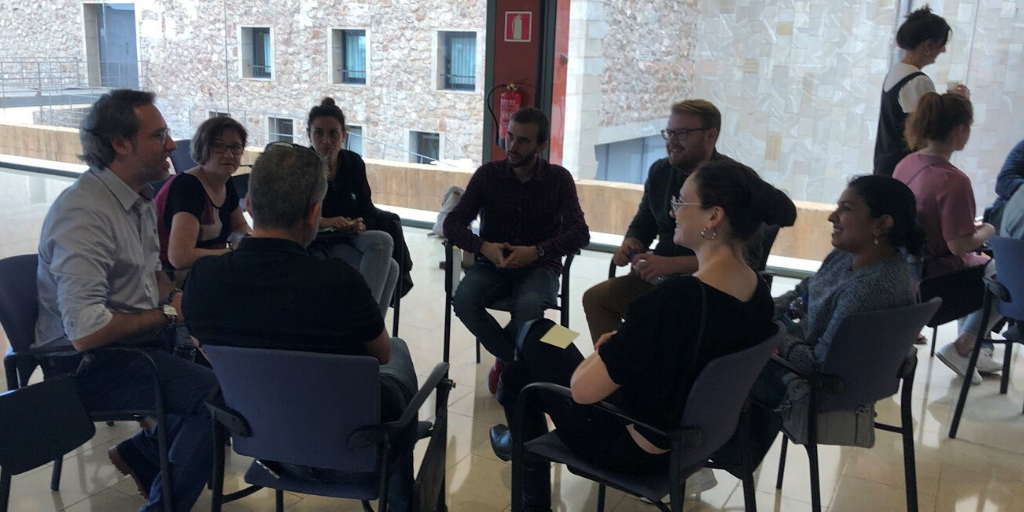During the first week of November I attended Nomad City 2019, a 3-day event in Las Palmas, Gran Canaria, Spain featuring workshops, keynotes, and discussions about remote work. Conferences are valuable learning experiences, and this event was no exception! I left the event feeling energized, informed, and better connected to a community of people who believe what I believe: remote work is critical to improving work, and by extension, our lives.
To use the conference tagline,
“We work from the places we love.”
Workplaceless’ mission is to positively impact both the supply (remote roles available) and demand (employees seeking remote roles) of sustainable remote work opportunities. We do that by providing engaging learning experiences that prepare people to thrive in remote work—and since these experiences are informed by current trends and best practices in remote work, we make sure that we’re involved in conversations like the ones hosted by Nomad City. With every conference we attend, we outline a Learning Plan to set and track learning goals for the conference.
Here’s what we learned and how we’re taking action.
From those who are new to remote or are seeking remote opportunities,
we learn about the specific challenges facing those who are unfamiliar with this space. For those of us who have been working remotely for a while, it can be all too easy to forget what those early days are like—and we need this empathy to make sure we’re creating solutions to their challenges, instead of increasing them.
From experienced remote workers and leaders,
we get an inside look into how highly effective remote teams optimize their processes, like Anna Holland-Smith’s session on Onboarding at Automattic, Marcus Wermuth’s “An Asynchronous Communications Workshop” from Buffer, and Henning Muszynski’s session on “Remote communication & collaboration” from Twist/Doist.
From thought leaders, researchers and advocates,
we get both a macro view of the current and potential impact of remote work, like Laurel Farrer from Distribute Consulting, as well as micro view of what’s really needed to succeed in a remote role, like Roberta Sawatzky’s session, “Identifying, screening for, and nurturing critical self-management traits”.
From community members,
we hear about the questions they have about how remote work can benefit them, and the challenges they face in capitalizing on the benefits of remote work. We also hear about the initiatives that are effectively leveraging remote work as an economic development strategy in the “Strategies for Economic Development through Remote Work” panel with Aaron Bolzle of Tulsa Remote, Laurel Farrer of Distribute Consulting, Chris Czerwonka of Mosabi, John O’Duinn of Release Mechanix, and Adam Austerfield of Futurelab Berlin.
In all of these conversations, we get to learn from varied and diverse perspectives—and yet, there were still common themes among many of those discussions.
The Big Questions
Throughout the conference the following questions kept coming up:
- How do we find the optimal communication and meetings strategy for our team? We need to strike the right balance of communicating ENOUGH without overwhelming each other with input
- How can we prevent isolation and burnout in our teams, and how can we identify those who are silently/invisibly struggling?
- How can an individual effectively make the case to management to let them work remotely?
- How can leaders and business owners deal with the complications of remote work, like compliance?
- What support can companies and managers provide team members to help them succeed, grow, and thrive?
It All Starts With Culture
So many of the challenges that we face as remote workers, leaders, business owners, and advocates can be traced back to our organizational culture. How you as a worker and how your team handle communication, performance management, conflict management, workflow, learning and development… all of that starts with your culture. That’s why in both the Leadplaceless and Goplaceless programs we talk about culture before we talk about anything else. And it’s why I chose culture as the topic for my workshop at Nomad City—it impacts everyone, which means everyone should have a part in developing and living culture. Here’s a peek into the workshop—as you can see, everyone had something to say:
What Next?
Now we’re back in our respective offices, and here’s how we’re taking action on our Nomad City learning:
- We reached out to our community to gather even more thoughts on preventing isolation and burnout.
- We brought our full curriculum team together to discuss both the big questions and best practices to integrate into our training programs
- We leveraged the community feedback at employee and manager levels to provide more resources and specifics within our Workplaceless, Leadplaceless, and forthcoming Growplaceless career development program.
- We’re continuing conversations with some of the remote leaders we met at the conferences to bring them on board as Subject Matter Experts in our courses.
There’s still more work to be done to answer these big questions and remote work, but we’re grateful and inspired to be a part of it’s continuous growth.





